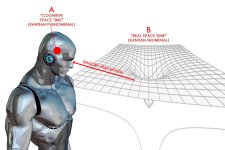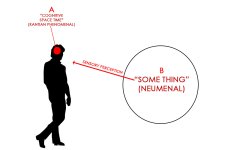modernPrimitive2
Member
Based on the derailing of another thread of mine, I'm creating this thread to explain why materialism is a metaphysical position and precisely what the implication are of that.
Firstly, some definitions:
Metaphysics (Britannica): The philosophical study whose object is to determine the real nature of things...
Materialism (Wikipedia): Materialism is a form of philosophical monism which holds that matter is the fundamental substance in nature...
It's clear from the definitions already that materialism is something of a metaphysical position, but let me elaborate for the sake of understanding the full implications of this and why it's important because there seems to be a hell of a lot of confusion about this. I'm going to reference Kant's Transcendental Idealism, but since it's rather complex to understand and needs to be read in the context of Kant's disagreements with Newtonian philosophers of his time I'm going to modernize his ideas here.
Let's consider a thought experiment on the fundamental nature of space-time.
Suppose we want to build a robot that like a human being is able to navigate through space and time. We'll begin by assuming the naive Newtonian metaphysic - that this is a material robot in a material reality that we call space-time. Now we could not simply place a camera for the eyes and various sensors on the parts of the robot to detect interactions with a supposed objective reality. We would also need some computer hardware and software that were able to process and "make sense" of this sensory input. Hence, the robot would need to have some form of space-time recognition programmed into it, the ability to identify discrete objects, obstacles, their size, weight, colour, dangers and so on. Furthermore we would have to "fine tune" this space-time cognition for the robots survival very much in line with Darwinian principles. Is water, fire or heat dangerous or is it a case of how much water, fire or heat? Assuming for example that the robot charged it's batteries off solar, how much sunlight is too little and how much sunlight is too much so as to cause the hardware to overheat...and so on. We'll call this "space time cognition" - "A" as opposed to our metaphysical "B" which we'll call "Real Space Time" - which is an objective reality that exists independent of any human (or robotic) cognition, as per the image below:

Now this poses a fundamental epistemological problem for our robot because A cannot be a perfect and accurate representation of B as it is in itself, but rather it must be skewed to the subjective interpretation and the fine-tuning necessary for the robots survival. So what does all empirical data that our robot collects actually describe? A or B? The answer is pretty clear here, empirical data describes A - cognitive space-time rather than B (Real Space Time), or possibly the very best case senario - it points to B but is heavily distorted by A.
Now bearing in mind that I made the metaphysical assertion that our robot is a real material robot in a real material space-time reality, if we are to be philosophically honest I must remove that assertion. Another way of saying that is that since it's particularly difficult to say exactly what B actually is given that as humans we are subject to it's interpretation by A, I must begin with the honest position of admitting that it is initially undefinable. And so we have an image that is more along the lines of this:

I don't think it's philosophically honest to take the Kantian philosophy to it's extreme and say that nothing can be known of the Noumenal (B). Kant himself admits that there must be a Neumenal, a "some thing" but resists any assertions about what it may be and that effectively sums up all metaphysics in that it gives us the epistemological limiations of what can be asserted about it. Certainly we cannot say what it is at the fundamental level - we cannot say that it is fundamentally "a substance" as materialism would have it. In fact, we can even see Kant's idea substantiated by quantum mechanics. Had he been alive in the 1900s he would have been thrilled. The very fact that quantum mechanics is counter-intuitive, that we get strange paradoxes that seem to infer (apparent) retro-causality, spooky action, improbability and so on infer that we have a very strong cognitive bias towards a Newtonian conception of space time. The closer we get to Kant's neumenal, the more counter-intuitive things become. There is no "material substance" to be find in quantum mechanics and reality seems far more unstable than our "Newtonian" intuition would have it.
And that should give a pretty clear idea of why materialism is a metaphysical position because it's simply an assertion about the Kantian neumenal (B), fundamentally "faith-based", irrefutable etc.
Firstly, some definitions:
Metaphysics (Britannica): The philosophical study whose object is to determine the real nature of things...
Materialism (Wikipedia): Materialism is a form of philosophical monism which holds that matter is the fundamental substance in nature...
It's clear from the definitions already that materialism is something of a metaphysical position, but let me elaborate for the sake of understanding the full implications of this and why it's important because there seems to be a hell of a lot of confusion about this. I'm going to reference Kant's Transcendental Idealism, but since it's rather complex to understand and needs to be read in the context of Kant's disagreements with Newtonian philosophers of his time I'm going to modernize his ideas here.
Let's consider a thought experiment on the fundamental nature of space-time.
Suppose we want to build a robot that like a human being is able to navigate through space and time. We'll begin by assuming the naive Newtonian metaphysic - that this is a material robot in a material reality that we call space-time. Now we could not simply place a camera for the eyes and various sensors on the parts of the robot to detect interactions with a supposed objective reality. We would also need some computer hardware and software that were able to process and "make sense" of this sensory input. Hence, the robot would need to have some form of space-time recognition programmed into it, the ability to identify discrete objects, obstacles, their size, weight, colour, dangers and so on. Furthermore we would have to "fine tune" this space-time cognition for the robots survival very much in line with Darwinian principles. Is water, fire or heat dangerous or is it a case of how much water, fire or heat? Assuming for example that the robot charged it's batteries off solar, how much sunlight is too little and how much sunlight is too much so as to cause the hardware to overheat...and so on. We'll call this "space time cognition" - "A" as opposed to our metaphysical "B" which we'll call "Real Space Time" - which is an objective reality that exists independent of any human (or robotic) cognition, as per the image below:

Now this poses a fundamental epistemological problem for our robot because A cannot be a perfect and accurate representation of B as it is in itself, but rather it must be skewed to the subjective interpretation and the fine-tuning necessary for the robots survival. So what does all empirical data that our robot collects actually describe? A or B? The answer is pretty clear here, empirical data describes A - cognitive space-time rather than B (Real Space Time), or possibly the very best case senario - it points to B but is heavily distorted by A.
Now bearing in mind that I made the metaphysical assertion that our robot is a real material robot in a real material space-time reality, if we are to be philosophically honest I must remove that assertion. Another way of saying that is that since it's particularly difficult to say exactly what B actually is given that as humans we are subject to it's interpretation by A, I must begin with the honest position of admitting that it is initially undefinable. And so we have an image that is more along the lines of this:

I don't think it's philosophically honest to take the Kantian philosophy to it's extreme and say that nothing can be known of the Noumenal (B). Kant himself admits that there must be a Neumenal, a "some thing" but resists any assertions about what it may be and that effectively sums up all metaphysics in that it gives us the epistemological limiations of what can be asserted about it. Certainly we cannot say what it is at the fundamental level - we cannot say that it is fundamentally "a substance" as materialism would have it. In fact, we can even see Kant's idea substantiated by quantum mechanics. Had he been alive in the 1900s he would have been thrilled. The very fact that quantum mechanics is counter-intuitive, that we get strange paradoxes that seem to infer (apparent) retro-causality, spooky action, improbability and so on infer that we have a very strong cognitive bias towards a Newtonian conception of space time. The closer we get to Kant's neumenal, the more counter-intuitive things become. There is no "material substance" to be find in quantum mechanics and reality seems far more unstable than our "Newtonian" intuition would have it.
And that should give a pretty clear idea of why materialism is a metaphysical position because it's simply an assertion about the Kantian neumenal (B), fundamentally "faith-based", irrefutable etc.
Last edited:
